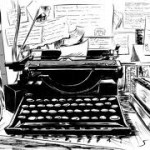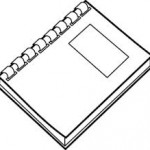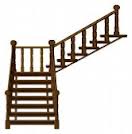One Christmas break, I returned home from college to find stacks of papers and notes littering the narrow counter in front of the glass bookshelves. “What’s this?” I asked Mother.
“Your father’s book.”
“He’s writing a book?” I asked incredulously. “What’s he writing about?”
“It’s a book on insulators,” she answered.
I stood speechless, looking around the room. Our house was literally acrawl with ceramic and glass insulators. Resembling giant upside down custard cups, they decorated entire walls of our home, standing neatly side by side in row upon row, along great lengths of narrow pine shelving. Like people, insulators come in all colors, shapes and sizes. My eye followed them around the shelf-lined walls, ceramic and glass, rows of sparkling aqua, purple, clear, red and blue, insulators with skirts and without, dimpled and sporting drip points, short, tall, thin and fat. They were embossed with names and logos of insulator factories back east, Pennsylvania, New Jersey, Michigan. Thousands of insulators, each one unique and different from the others, an almost infinite variety of color, shape, size and manufacture: a collector’s wildest dream.
Best yet, every telephone pole in the country, nay, in the world, held at least four insulators high up in the air where the electric cables were attached, miles and millions of miles of cable, telephone poles. And insulators…ripe for the picking.
In the best of circumstances, one could find insulators on the ground when telephone lines collapsed or were changed out. In the worst of circumstances, insulator collectors learned how, as they climbed, to carry a cheap undesirable ugly insulator up to the top of a telephone pole, disconnect the live telephone wire from the beaming beauty of his desire, and perched at the top of the pole, bagging Ms. Beauty, he left Mr. Ugly on the peg in her place. Worse than being illegal, this was a life-threatening feat.
Having the time of their lives, my father and other grown men like him traveled the back roads of desert and forest, searching for downed telephone lines removing insulators from the crossbeams and packing them away in cardboard boxes.
Then the men did what only men can do. They got together in each others’ homes and at trade shows to show off their ‘stuff,’ recounting the heroics needed to bring down special rare ‘babes,’ and trading away duplicates in exchange for gem finds held by other insulator hunters.
And late into the night, whispering under dim lights, when the trading and dealing was finished, soaking in the fellowship of their selective club, one man eventually held a shining glass aqua insulator up under the bare light bulb and asked, “Bet you can’t guess where this baby came from?” And they couldn’t. So he told them, until by two in the morning, every collector had boasted of his own particular harrowing story, when following a string of live telephone poles miles back into uninhabited wilderness and stretching and stepping across thousands of coiled hissing rattlesnakes, he had climbed a greased electric pole two million feet into the clouds and performed the world’s greatest insulator ‘trade-out’ in mid-air.
“Who’s going to buy a book on insulators?” I marveled out loud.
“Other collectors,” Mother answered.
“All 100 of them?” I thought. Any other questions I had were squelched by an unwritten rule of our home: Nothing is Impossible.
How could my father write a book? About insulators, no less! Books were born by big books at night on the bookshelf, book babies. Perhaps packets of book seeds were sold with each Webster’s Dictionary. Authors? They were dead people who had harvested books off mature book vines years ago. Nobody really wrote books. Not real people with two feet who lived in houses.
How could I know back then that writing a book was more like a disease: graphomania? Really. How could I know I had contracted graphomania in the womb and that one day it would bubble to the surface, one letter at a time, like a flood of freckles? How could I know I would one day grow bald, pulling and tugging at my hair, consuming entire days, even weeks, throwing those pesty alphabet freckles onto paper, trying to rid myself of the curse?
Anyone who shares the curse will know the pain that inspires the pages that follow.
***********************************************
THE WRITER’S LIFE
Copyright 2013. All Rights Reserved.






